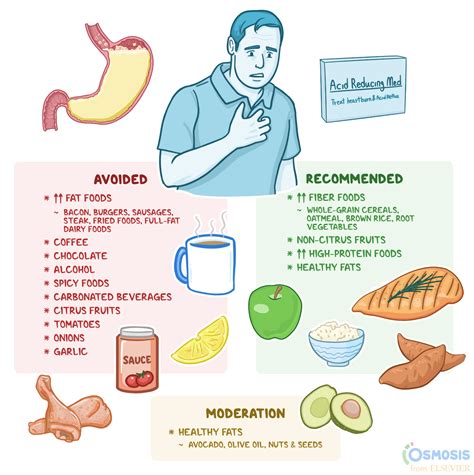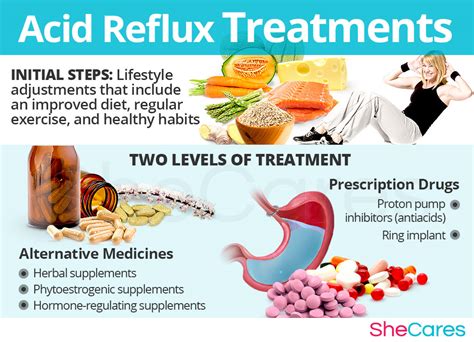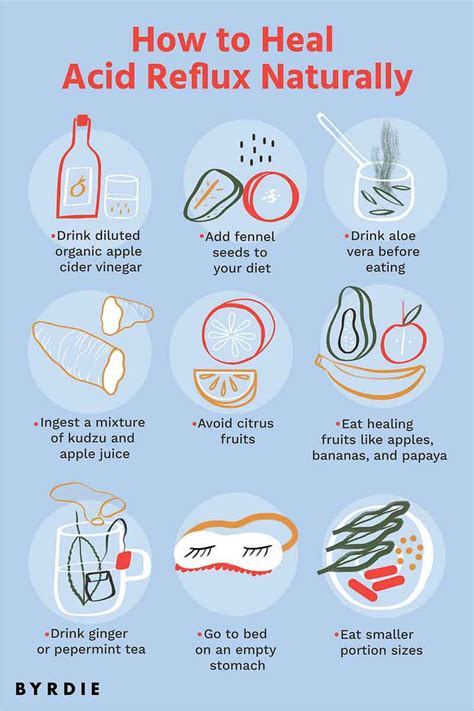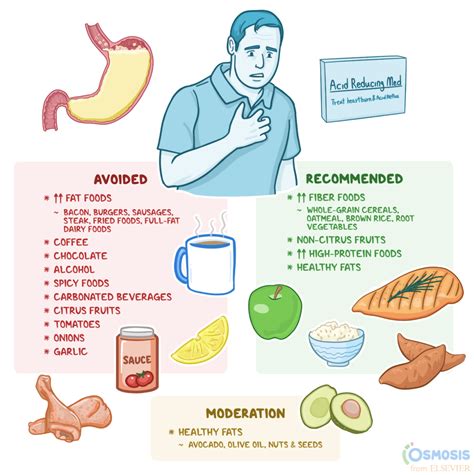Intro
Treat acid reflux naturally with 5 effective ways, alleviating heartburn, bloating, and discomfort using dietary changes, lifestyle modifications, and home remedies, reducing symptoms and promoting digestive health.
Acid reflux, also known as gastroesophageal reflux disease (GERD), is a common condition that affects millions of people worldwide. It occurs when stomach acid flows back up into the esophagus, causing symptoms such as heartburn, chest pain, and difficulty swallowing. If left untreated, acid reflux can lead to more serious health problems, such as esophageal damage and respiratory issues. Fortunately, there are several ways to treat acid reflux, and making lifestyle changes is often the first step.
Acid reflux can be triggered by a variety of factors, including diet, obesity, and certain medical conditions. Foods that are high in fat, citrus, and spices can relax the lower esophageal sphincter, allowing stomach acid to flow back up into the esophagus. Additionally, being overweight or obese can put pressure on the stomach, causing acid to flow back up into the esophagus. Certain medical conditions, such as hiatal hernia and gastroparesis, can also increase the risk of acid reflux. Understanding the causes of acid reflux is essential to developing an effective treatment plan.
The good news is that acid reflux can be treated and managed with a combination of lifestyle changes, dietary modifications, and medical treatments. By making a few simple changes to your daily routine and eating habits, you can reduce the frequency and severity of acid reflux symptoms. In this article, we will explore five ways to treat acid reflux, including dietary changes, lifestyle modifications, and medical treatments. Whether you are experiencing mild or severe acid reflux symptoms, there are steps you can take to alleviate your discomfort and improve your overall health.
Understanding Acid Reflux

Causes of Acid Reflux
The causes of acid reflux are varied and complex. Some common causes of acid reflux include: * Eating large or heavy meals * Lying down after eating * Eating foods that trigger acid reflux, such as citrus fruits and tomatoes * Being overweight or obese * Having a hiatal hernia or other medical condition * Taking certain medications, such as sedatives and antidepressants By understanding the causes of acid reflux, you can take steps to reduce your risk of developing the condition.Dietary Changes for Acid Reflux

Foods to Avoid
Some foods can trigger acid reflux symptoms, while others can help alleviate them. By avoiding trigger foods and eating foods that are gentle on the stomach, you can reduce the frequency and severity of acid reflux symptoms. Some foods to avoid include: * Processed meats, such as hot dogs and sausages * Fried foods, such as french fries and fried chicken * High-fat foods, such as cheese and butter * Citrus fruits and juices, such as orange and grapefruit By making a few simple changes to your diet, you can reduce the frequency and severity of acid reflux symptoms.Lifestyle Modifications for Acid Reflux

Benefits of Lifestyle Modifications
Lifestyle modifications can have a significant impact on acid reflux symptoms. By losing weight, avoiding tight clothing, and avoiding lying down after eating, you can reduce the frequency and severity of acid reflux symptoms. Additionally, elevating the head of your bed and avoiding smoking and secondhand smoke can help prevent stomach acid from flowing back up into the esophagus. Some benefits of lifestyle modifications include: * Reduced frequency and severity of acid reflux symptoms * Improved overall health and well-being * Increased energy and vitality * Improved sleep quality By making a few simple changes to your lifestyle, you can reduce the frequency and severity of acid reflux symptoms and improve your overall health and well-being.Medical Treatments for Acid Reflux

Types of Medical Treatments
There are several types of medical treatments that can help alleviate acid reflux symptoms. These include: * Over-the-counter medications, such as antacids and H2 blockers * Prescription medications, such as PPIs and surgery * Alternative therapies, such as acupuncture and herbal remedies By working with your healthcare provider, you can determine the best course of treatment for your acid reflux symptoms.Natural Remedies for Acid Reflux

Benefits of Natural Remedies
Natural remedies can have a significant impact on acid reflux symptoms. By incorporating natural remedies into your treatment plan, you can reduce the frequency and severity of acid reflux symptoms and improve your overall health and well-being. Some benefits of natural remedies include: * Reduced frequency and severity of acid reflux symptoms * Improved overall health and well-being * Increased energy and vitality * Improved sleep quality By incorporating natural remedies into your treatment plan, you can reduce the frequency and severity of acid reflux symptoms and improve your overall health and well-being.Managing Acid Reflux Symptoms

Importance of Managing Acid Reflux Symptoms
Managing acid reflux symptoms is essential to reducing the frequency and severity of symptoms and improving overall health and well-being. By working with your healthcare provider and making a few simple changes to your daily routine, you can reduce the risk of complications and improve your quality of life. Some importance of managing acid reflux symptoms include: * Reduced risk of complications, such as esophageal damage and respiratory issues * Improved overall health and well-being * Increased energy and vitality * Improved sleep quality By managing acid reflux symptoms, you can reduce the frequency and severity of symptoms and improve your overall health and well-being.What are the common causes of acid reflux?
+The common causes of acid reflux include eating large or heavy meals, lying down after eating, eating foods that trigger acid reflux, being overweight or obese, having a hiatal hernia or other medical condition, and taking certain medications.
How can I manage acid reflux symptoms?
+You can manage acid reflux symptoms by keeping a food diary to track trigger foods, avoiding lying down after eating, elevating the head of your bed, avoiding smoking and secondhand smoke, and incorporating natural remedies into your treatment plan.
What are the benefits of natural remedies for acid reflux?
+The benefits of natural remedies for acid reflux include reduced frequency and severity of acid reflux symptoms, improved overall health and well-being, increased energy and vitality, and improved sleep quality.
How can I reduce the risk of complications from acid reflux?
+You can reduce the risk of complications from acid reflux by managing acid reflux symptoms, avoiding trigger foods, and incorporating natural remedies into your treatment plan.
What are the importance of managing acid reflux symptoms?
+The importance of managing acid reflux symptoms include reduced risk of complications, improved overall health and well-being, increased energy and vitality, and improved sleep quality.
We hope this article has provided you with a comprehensive understanding of acid reflux and its treatment options. By making a few simple changes to your daily routine and incorporating natural remedies into your treatment plan, you can reduce the frequency and severity of acid reflux symptoms and improve your overall health and well-being. If you have any questions or concerns, please don't hesitate to comment below or share this article with a friend or family member who may be experiencing acid reflux symptoms. Remember, managing acid reflux symptoms is essential to reducing the risk of complications and improving overall health and well-being. Take the first step today and start managing your acid reflux symptoms!
